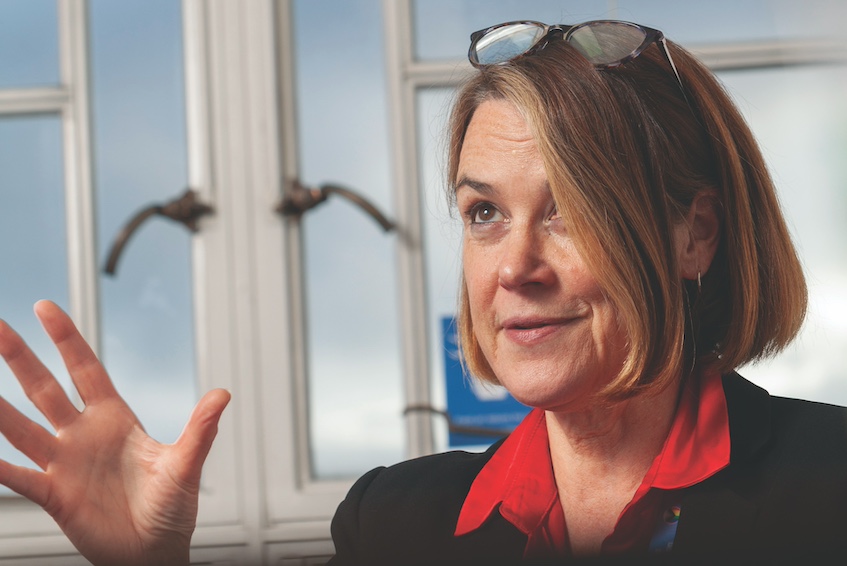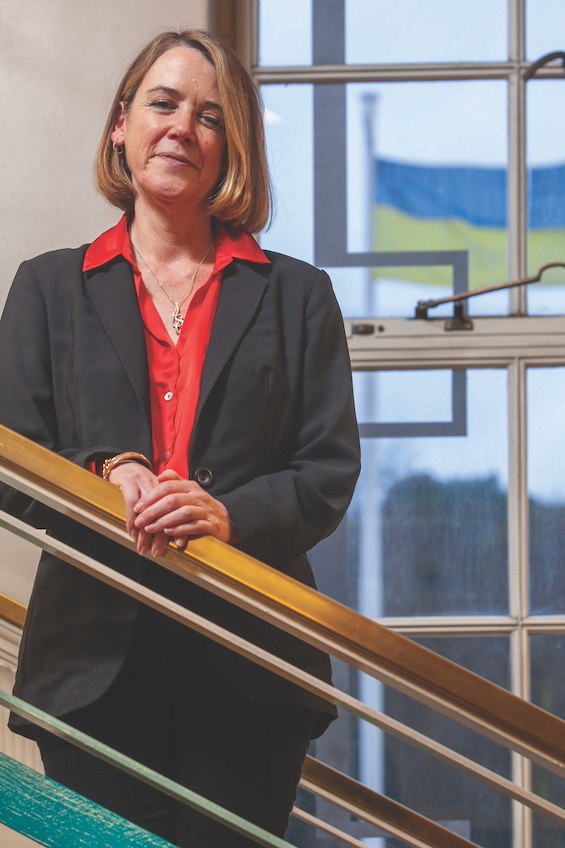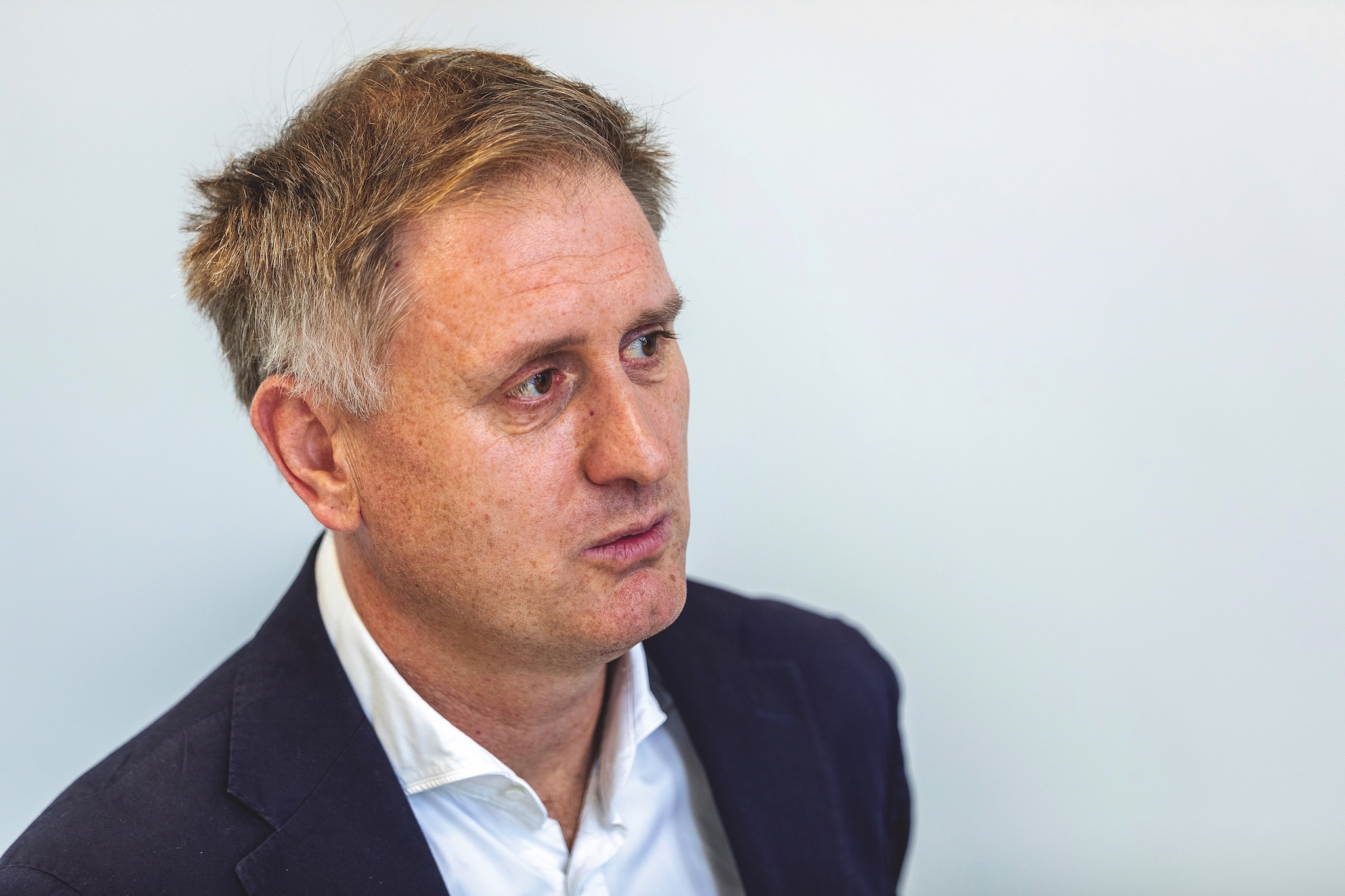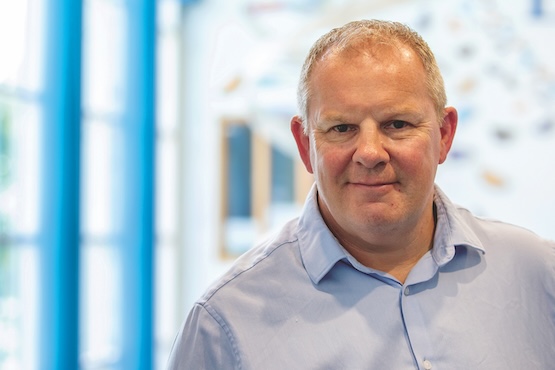Caroline Lamb: In at the deep end
Joining the Scottish health department just weeks before the pandemic struck, Caroline Lamb found herself as head of NHS Scotland within a year. She tells Matt Ross about the “intense and scary” experience of managing through the Covid crisis, her plans to integrate services and tackle staff shortages and why Scotland needs more money for health and care.

“It was very intense; at times it was quite scary, and quite upsetting,” says Caroline Lamb, recalling those terrible months after the Covid pandemic erupted in March 2020. “I remember looking at the projections for how many people we could have [arriving] in ICU, and thinking, ‘Oh my God!’ Fortunately, that’s not where we ended up – but it was a really tough period.”
Lamb, who is both the chief executive of NHS Scotland and the Scottish Government’s director-general for health and social care, found herself going over those uncomfortable memories earlier this year, as she prepared to give evidence to the Scottish Covid-19 Inquiry. The experience brought back “that fear of not knowing whether you were doing the right thing,” she says – and no wonder: not only was Lamb dealing with a brand new disease, she’d only joined the civil service “about four weeks before everything started kicking off; so that was amazing timing!”
After a career in public sector finance jobs and a stint as chief executive of NHS Education for Scotland (NES), Lamb had moved into central government in December 2019—initially in a secondment role, as director of digital reform and service engagement for health and care. As Covid spread, her digital skills and relationships with health board chief executives—built up during 14 years at NES—brought many of the fresh challenges presented by this novel virus to her desk.
She first rolled out the ‘Near Me’ remote consultation service, then turned to expanding ICU capacity. “When it became clear that we probably weren’t going to be overwhelmed in ICU, we’d just announced our ‘Test to Protect’ strategy – so I led the contact-tracing bit of that,” she recalls. “Then the vaccination programme.” In the midst of all this, Malcolm Wright, then NHS chief executive, stepped down due to ill health and in January 2021, just 13 months after entering government, Lamb succeeded him. “It was quite a journey,” she says with some understatement.
Sustainability means reducing demand
Lamb says her most important mission in the job is “engagement across Scottish Government”. That’s because “80% of the determinants of poor health have nothing to do with what we do in health and social care: it’s all about employment, housing, social conditions,” she explains. “If health stands on its own, then we will forever just be the repair shop.
“The way to move to a more sustainable system is to reduce some of the demand,” she continues. “And we’ll do that through playing our part in better employment, better education attainment, greener communities, and working with partners around areas like housing and the economy.” Health boards and social care organisations must make full use of their roles as major employers and anchor institutions in their local communities, she adds. Meanwhile, she encourages other civil service leaders to promote public health within their own policies.
Collaboration is equally important in Scotland’s Integration Joint Boards (IJBs) – which bring NHS boards together with local authority social care services – and in the broader, place-based community planning partnerships (CPPs). Progress here accelerated when Covid arrived: “The pandemic was awful, but it did simplify the world a little bit. For that period, we had one thing to focus on,” says Lamb. “The pandemic built closer working relationships, and demonstrated the value of integration to the system more broadly.”
To pursue this agenda, the next generation of health and care leaders will need to be “supportive of staff, supportive of innovation,” and able to work “with partners in ways that benefit the population in your area, in an environment where you don’t have all the levers to pull,” says Lamb. “As the financial climate gets tougher, it’s even more important that we’re working across the piece.”
That also entails close collaboration between employers and unions in local area partnership forums. “When we do annual reviews with health boards, we sit down with the area partnership forum and hear from them about what’s working, what isn’t working; and what we would be expecting to hear is that those relationships are robust,” she says. Senior NHS leaders are expected to work in partnership with union representatives and engage them in decisions about services, she adds.
We value the workforce
Scotland’s success in avoiding the pay strikes seen in England has, Lamb says, “helped to preserve and maintain those relationships” with unions. In 2023–24, the Scottish Government agreed an Agenda for Change deal for giving those earning under £57,769 a lump sum payment and a 6.5% rise, comfortably topping England’s 5% settlement. Averting strikes has been hugely beneficial, “not just because it has prevented us from having to cancel operations and appointments, but also because it reflects the fact that we value the workforce”: making a relatively generous offer, she believes, sent an important signal to staff.
However, more senior staff saw their rise capped at £3,755, generating significant real-terms pay cuts for many MiP members. Is Lamb concerned about the risk of losing highly-skilled people to the private sector? “I guess it depends on the extent to which people are motivated by that bit of the overall package,” she replies, emphasising the NHS’s strong employee benefits and the chance to “improve people’s lives”. Public/private pay differentials for technical professionals are becoming unsustainable, I suggest: “There are absolutely some aspects – and digital would be a key one – where it’s not only that we’re in competition, but also that there aren’t enough good people out there,” she concedes. “And that’s a challenge.”
 Lamb: “There’s an enormous financial challenge. You’ve heard what the IMF have said about investing more in public services—I couldn’t agree more with that.”
Lamb: “There’s an enormous financial challenge. You’ve heard what the IMF have said about investing more in public services—I couldn’t agree more with that.”Indeed, NHS Scotland is not short of challenges. Winter performance against the A&E four-hour wait target has hovered around 60–65% for the last two years, way below the 95% target: “2021–22 was a really hard winter; 22–23 wasn’t great either,” says Lamb frankly. “23–24 feels a bit calmer, but that might just be because we’ve normalised working at very, very high levels of pressure.” On elective treatments, “all health services have built up a backlog as a result of the COVID pandemic,” she adds. “We’re also dealing with a population – particularly the elderly population – that got deconditioned during the pandemic.”
To close those gaps, Scotland must address recruitment and retention problems – particularly acute in social care – that mirror those in other parts of the UK. “The impact of Brexit has reduced some of the access to labour markets in social care,” comments Lamb. “So that challenge across the system – being able to keep flow through the hospital, and having people exiting the back door as well as managing demand at the front door – has become quite difficult.”
She does, however, argue that Scotland moved early to tackle the problem. Referring to NHS England’s Long Term Workforce Plan, she says: “What England is trying to do is – I’m not being complacent here – a lot of the things we’ve been doing for the last few years”. Unlike England, she adds, Scotland isn’t trying to “eliminate international recruitment” – but it has been working to build “strong, secure pipelines for recruiting into healthcare”, increasing the numbers of undergraduates, postgraduates, nursing training places and apprenticeships.
Lamb’s team has also been trying to improve the employment offer in the care sector, which loses a stream of staff to better-paid NHS jobs. “We’re moving towards paying £12 an hour for social care from the 1 April. That’s additional funding that’s gone in to try to make sure there isn’t such a big gap,” she comments.
Tough questions on social care
Lamb acknowledges, though, that the social care sector faces huge problems – with margins for providers so tight that some local authorities are struggling to let contracts. “A more collaborative approach to commissioning” can help by, for example, cutting the staff travel required, she says, but acknowledges that “there are some real questions around areas where we have a predominantly private model.” These locations tend to be “much more challenging in terms of sustainability,” she adds. “So having that core capacity in the public and third sector is really important.”
The Scottish Government had hoped to solve these problems with a National Care Service, but in December it announced a three-year delay and abandoned plans to take control over services from local authorities. Lamb sounds relieved to have avoided that battle: “We have always been clear from the outset that we wanted to work with local government,” she says, explaining that she and COSLA, the Scottish councils association, have been looking for “points of consensus. What are the things that we can do together, rather than getting into a fight over what’s the best thing to do?”
This sounds sensible: government cannot both expect IJBs and CPPs to rebuild services around local needs, and at the same time create a monolithic, uniform national care service. The National Care Service (Scotland) Bill’s stated aims, which include ensuring that services “are operated in the same way and at the same standard throughout Scotland”, receive less than wholehearted support from Lamb. “To the same standard,” she says pointedly. “We want equality of access; we would like to move towards a single way of assessing people’s needs; and we would like services to be operating to consistent standards.”
The project is not dead, Lamb insists, but altered: “What matters is that we continually improve. And that’s challenging when you don’t have additional resources to put into problems.” The National Care Service was expected to cost upwards of £650 million over five years, while Audit Scotland’s latest assessment estimates that NHS boards will face a combined £500 million deficit by 2025–26 – and that’s if they hit their ambitious savings targets.
“An enormous financial challenge”
“We had a number of boards with underlying financial problems going into the pandemic,” comments Lamb. “The pandemic blurred that, because of the level of additional funding. Now the pandemic funding has gone, but we’ve been left with the backlog and with the impact: we’ve still got people being admitted to hospital with Covid.”
Here, as with NHS performance and the state of social care, Lamb is open about the problems facing Scotland’s health and care systems. “There’s an enormous financial challenge,” she says. Speaking before UK Chancellor Jeremy Hunt’s March Budget, she makes a plea for additional resources: “You’ve heard what the IMF have said about the need to think less about cutting taxes and more about investing in public services, and I couldn’t agree more with that,” she says.
NHS Boards are “busily preparing their draft plans, with some really, really challenging savings targets,” she adds. But Lamb also calls for further Barnett ‘consequentials’ – meaning additional funding from the UK government: “There is a requirement for us to see more consequentials from England that help us to fund health services”.
Caroline Lamb has really been through the mill since she joined NHS Scotland – walking straight into the worst pandemic in a century. Within weeks of her arrival, she recalls, thousands were dying. Civil service and NHS staff “worked so, so hard: people were working unbelievably ridiculous hours” to protect and care for the public, she says. Now she’s struggling to repair services, reduce waiting lists and heal a battered workforce. I have to ask: does she ever regret taking that secondment back in December 2019? “No,” she replies without hesitation. “I’m passionate about this. It’s a tough gig, but it’s an absolute privilege.”
Related News
-

“Showing kindness and trust creates a virtuous circle – people respond well to that”
As chief executive of Suffolk and North East Essex, one of England’s most highly rated integrated care boards, Ed Garratt has pioneered a radically different approach to leadership – one based around kindness, trust and putting down deep roots in local communities. He talks to Healthcare Manager’s Matt Ross.
-

We need to give managers reasons to join the profession — not risks to avoid
Steve McManus’s work developing the leaders and managers the NHS needs for the 21st century has caught the eye of national leaders. The Royal Berkshire trust chief executive talks to Matt Ross about transforming services, developing leaders and the right way to regulate the management profession.
-

Interview: Dr Phil Hammond, doctor, comedian, health campaigner
Doctor, comedian, broadcaster, writer, health campaigner and politician manqué, Dr Phil Hammond is now drawing up a manifesto to rescue the NHS and boost the nation’s health. On the eve of a watershed general election for the UK, he spoke to Healthcare Manager’s Matt Ross.